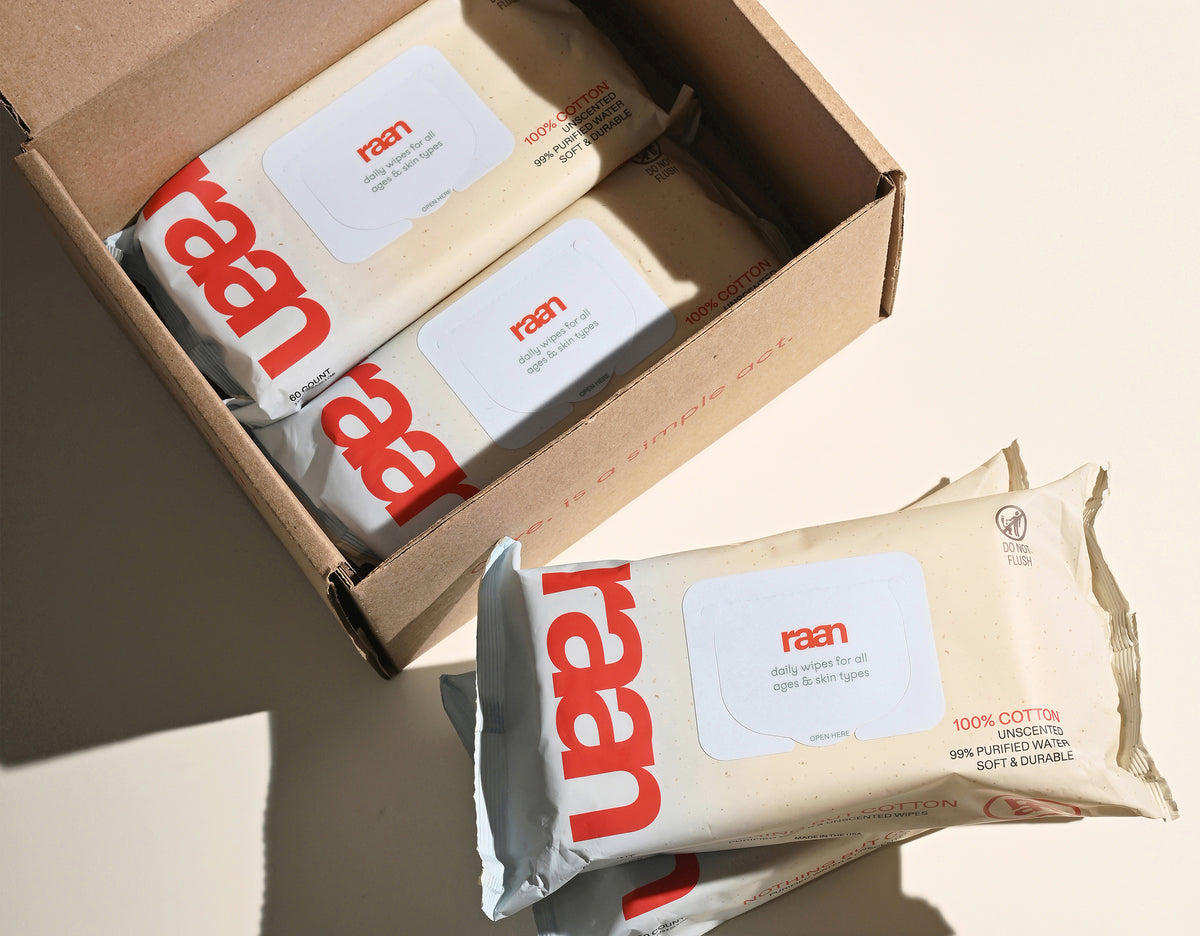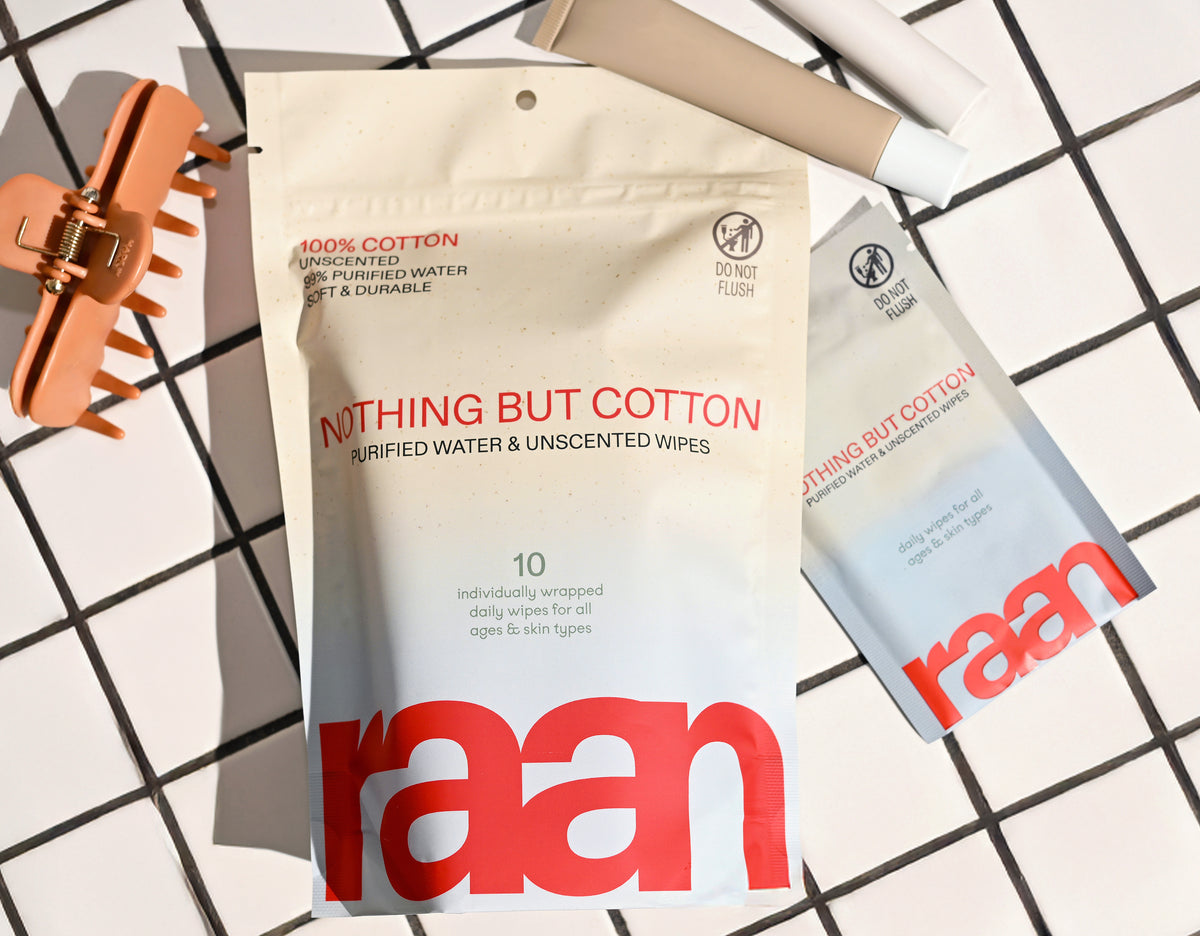Key Takeaways
- Biodegradable cotton wipes offer a natural alternative to synthetic cleaning products.
- Many wipes marketed as "eco-friendly" still contain synthetic fibers and unclear ingredients.
- Understanding what "clean" truly means is essential when choosing cleaning wipes.
- Consumers often face confusion due to vague labeling and marketing claims on wipes.
Table of Contents
- The Real Deal on Biodegradable Cotton Wipes
- What Are Biodegradable Cotton Wipes?
- Why Biodegradable Cotton Wipes Matter
- Key Materials & Ingredient Standards
- Biodegradability vs. Compostability
- How to Choose the Right Biodegradable Cotton Wipes
- Everyday Uses for Biodegradable Cotton Wipes
- Best Biodegradable Cotton Wipes: Our Top Picks
- Environmental Impact: The Bigger Picture
- Final Word: Thoughtful Cleaning, Honest Care
The Real Deal on Biodegradable Cotton Wipes
Everyday mess is real , but so is the confusion around what "clean" actually means. Walk down any cleaning aisle and you'll find shelves packed with wipes promising everything from "natural" to "eco-friendly," yet most are loaded with synthetic fibers, mystery preservatives, and vague claims that leave you guessing what's actually touching your skin.
Here's what we know: truly biodegradable cotton wipes for cleaning bring back function, clarity, and peace of mind for thoughtful homes. They're made from unbleached, 100% cotton and a minimalist blend of ingredients you can actually pronounce. No plastic fibers. No harsh chemicals. No trade-offs between what works and what's safe.
Whether you're a new mom navigating overwhelming product labels, a pet owner dealing with muddy paws, or someone who simply wants transparency in everyday essentials, biodegradable cotton wipes offer a straightforward solution that's safe for sensitive skin and gentle on the planet.
What Are Biodegradable Cotton Wipes?

Biodegradable cotton wipes are cleaning essentials made from unbleached, 100% cotton and a carefully selected blend of non-toxic, EWG-verified ingredients. Unlike conventional wipes that rely on synthetic materials and harsh preservatives, these wipes are designed to break down naturally without lingering in landfills or waterways for decades.
Key Fact: 20 billion plastic-laced wipes end up in US landfills every year, taking 100+ years to decompose. Cotton wipes break down naturally in months, not centuries.
How They Differ from Traditional Wipes
The difference comes down to materials and transparency. Traditional wipes often contain synthetic fibers like polyester, rayon, or plastic blends that never fully biodegrade. They're also loaded with fragrances, sulfates, parabens, and preservatives that can irritate sensitive skin.
Biodegradable cotton wipes stick to the essentials: soft, unbleached cotton that cleans effectively without scratching or leaving residue, paired with food-grade preservatives and skin-conditioning ingredients. What you won't find are harsh chemicals, synthetic fragrances, or unnecessary fillers.
- No synthetic fibers (polyester, rayon, or plastic)
- No harsh chemicals, fragrances, or unnecessary additives
- Made with unbleached, 100% cotton for gentle yet effective cleaning
- Formulated with food-grade preservatives for safety
Why Biodegradable Cotton Wipes Matter
The environmental and health benefits of choosing biodegradable cotton wipes extend far beyond personal preference. These wipes address real problems with conventional cleaning products while offering practical solutions for everyday use.
Environmental Impact
Synthetic wipes contribute to a massive waste problem. They contain microplastics that don't break down, contaminating soil and waterways long after disposal. Biodegradable cotton wipes decompose naturally, reducing landfill waste and eliminating microplastic pollution.
When disposed of properly, cotton wipes are fully home-compostable, breaking down in 1-6 months depending on compost conditions. This creates a closed-loop system where waste becomes nutrient-rich soil rather than persistent pollution.
Skin Safety and Health
For families with sensitive skin, newborns, or anyone dealing with allergies, ingredient transparency matters. Biodegradable cotton wipes eliminate common irritants found in conventional products while maintaining effective cleaning power.
Dermatologists and pediatricians trust cotton-based wipes for newborn care because they're gentle enough for the most delicate skin while still providing thorough cleansing.
The benefits include no microplastic exposure, no fragrance-induced irritation, and complete ingredient transparency so you know exactly what's touching your skin.
Key Materials & Ingredient Standards

Understanding what goes into biodegradable cotton wipes , and what's deliberately left out , helps you make informed choices for your family's health and the environment.
Cotton as a Cleaning Fiber
Unbleached, 100% cotton outperforms synthetic blends for safe, simple cleaning because of its natural fiber structure. Cotton's absorbent properties and soft texture make it ideal for gentle yet effective cleansing without scratching surfaces or irritating skin.
The key difference lies in sourcing and processing. Quality biodegradable cotton wipes use cotton that's free from pesticides, chemical residues, and unnecessary bleaching processes that can leave harsh chemicals behind.
Material Fact: Unbleached cotton maintains its natural strength and absorbency while eliminating exposure to chlorine compounds used in conventional bleaching.
What's Inside (And What's Noticeably Absent)
The best biodegradable cotton wipes contain just what's needed for effective, safe cleaning:
- 99% purified water for gentle cleansing without residue
- Food-grade preservatives (sodium benzoate, potassium sorbate) for product safety , not "natural," just proven safe
- Organic aloe for skin comfort and moisture
- Citric acid for balanced pH levels
- Ethylhexylglycerin for gentle skin conditioning
What you won't find: bleach, plastic fibers, phthalates, parabens, sulfates, or synthetic fragrances. This minimalist approach eliminates common irritants while maintaining cleaning effectiveness.
Certifications That Matter
Third-party certifications provide verification that goes beyond marketing claims. EWG Verified means every ingredient has been reviewed by the Environmental Working Group for safety. The Natural Cotton Seal confirms the cotton meets strict standards for natural fiber content and processing.
Other meaningful certifications include Cruelty Free verification, Women Owned business certification, and Made in USA standards that ensure quality control and ethical manufacturing practices.
Biodegradability vs. Compostability
These terms are often used interchangeably, but understanding the difference helps you dispose of wipes properly and maximize their environmental benefits.
What's the Difference?
Biodegradable wipes break down through natural processes anywhere there's sufficient moisture and microbial activity. This includes landfills, soil, and water environments, though the timeline varies significantly based on conditions.
Compostable wipes are designed to break down completely in specific composting conditions, leaving no toxic residue. Look for "OK compost HOME" certification as the benchmark for home composting suitability.
Important: Even truly biodegradable wipes should never be flushed. They can contribute to sewer clogs and infrastructure problems regardless of their ability to break down naturally.
Proper Disposal Practices
For best environmental results, dispose of biodegradable cotton wipes in home compost bins or municipal green waste programs when available. The cotton and natural ingredients will break down into nutrient-rich compost within 1-6 months under proper conditions.
When composting isn't an option, landfill disposal is still significantly better than synthetic alternatives. Cotton wipes will biodegrade much faster than plastic-based products, reducing long-term environmental impact.
Timeline expectation: Cotton wipes in active compost break down in 1-3 months. In landfills, they decompose in 6 months to 2 years , dramatically faster than synthetic wipes that can persist for over a century.
How to Choose the Right Biodegradable Cotton Wipes

Not all wipes marketed as "biodegradable" deliver on their promises. Here's your checklist for smart selection that cuts through marketing claims to find products that actually work.
Smart Selection Checklist
- Verify fiber source: Look for 100% unbleached cotton, not "cotton blend" which often contains synthetic fibers
- Review ingredient list: Should contain only water, food-grade preservatives, and skin conditioners , nothing more
- Check certifications: EWG Verified, Natural Cotton Seal, and other third-party verifications provide credibility
- Assess packaging: Reduced plastic content, recyclable materials, or post-consumer waste content shows environmental commitment
Rule Out Greenwashed Claims
Watch for vague language that sounds good but means nothing specific. Terms like "eco-friendly," "natural," or "chemical-free" without supporting details are red flags for greenwashing.
Legitimate biodegradable cotton wipes provide specific information: exact cotton content, named preservatives with safety ratings, and clear disposal instructions. If a brand won't tell you exactly what's in their product, choose one that will.
Everyday Uses for Biodegradable Cotton Wipes
Biodegradable cotton wipes excel in real-world situations where you need reliable cleaning without compromising on safety or environmental responsibility. Their versatility makes them essential for busy families, pet owners, and anyone who values function over flashy claims.
Multifunctional for Real Life
These wipes handle diaper changes and baby clean-ups with the gentleness newborn skin requires, while being tough enough for messy toddler faces and sticky fingers. They work equally well as an on-the-go face and hand refresher for kids, parents, or anyone post-gym who needs a quick clean without harsh chemicals.
Pet owners rely on biodegradable cotton wipes for cleaning muddy paws after walks, wiping down pet areas, and handling the inevitable messes that come with furry family members. The cotton's natural absorbency and gentle formula won't irritate sensitive paw pads or cause reactions if pets lick cleaned areas.
For everyday surfaces like desks, phones, or kitchen counters where you want truly clean results, these wipes provide effective cleaning without leaving chemical residues. They're safe enough to integrate into sensitive skincare routines as a gentle cleansing step.
Storage Tip: Keep wipes in a cool, dry place away from direct sunlight to maintain freshness and prevent the natural cotton from drying out prematurely.
Travel-Friendly Convenience
Lightweight, compact packaging makes biodegradable cotton wipes ideal for travel bags, diaper bags, and gym bags. Quality options feature leak-resistant packaging that won't burst in luggage or create messes in your car.
Unlike bulky plastic containers, flexible pouches take up minimal space while providing the same number of wipes. This makes them practical for airplane travel, camping trips, or any situation where space and weight matter.
Best Biodegradable Cotton Wipes: Our Top Picks
After evaluating ingredients, certifications, and real-world performance, here are the biodegradable cotton wipes that deliver on their promises without greenwashing or compromise.
Raan Cotton Wipes - Best Overall
Best for: Families seeking complete transparency and proven safety
Rating: 5/5 stars
Raan sets the new standard for biodegradable cotton wipes with unbleached, 100% cotton and just five EWG-verified ingredients. The formula contains 99% purified water, food-grade preservatives, organic aloe, citric acid for pH balance, and ethylhexylglycerin for gentle conditioning.
What makes Raan exceptional is their commitment to full transparency , no vague "natural" claims, no hidden synthetic fibers, and no compromise on function. The packaging uses 70% less plastic than standard wipes, with 35% post-consumer waste content and 100% recyclable boxes.
Other Popular Brands
Best for: Budget-conscious families wanting plant-based options
Rating: 3.5/5 stars
Some alternative solutions use plant-based materials and avoid harsh chemicals, making them a reasonable option for families prioritizing affordability. However, many contain a blend of fibers rather than pure cotton, which affects the biodegradability timeline.
Best for: Parents seeking widely available natural options
Rating: 3/5 stars
Available in most major retailers, these wipes offer convenience and plant-based ingredients. The formulas often include more preservatives than necessary, and the packaging may still rely heavily on plastic components.
Environmental Impact: The Bigger Picture
Choosing biodegradable cotton wipes creates ripple effects that extend far beyond your household cleaning routine. Understanding these impacts helps you make decisions that align with your values while supporting genuinely sustainable practices.
Cotton vs. Synthetic: The Real Environmental Story
Cotton wipes break down completely in home compost within 1-6 months, leaving behind nutrients that enrich soil. Synthetic wipes persist in landfills for over 100 years, slowly releasing microplastics that contaminate groundwater and food chains.
The manufacturing impact also differs significantly. Unbleached cotton processing requires no chlorine compounds or harsh chemicals that create toxic wastewater. Synthetic fiber production relies on petroleum-based materials and energy-intensive manufacturing processes.
Environmental fact: Every year, 20 billion plastic-laced wipes enter US landfills. Switching to biodegradable cotton wipes eliminates your contribution to this waste stream entirely.
Why Packaging Innovations Matter
The most sustainable wipe becomes less environmentally friendly when wrapped in excessive plastic packaging. Look for brands that prioritize reduced plastic content, incorporate post-consumer recycled materials, and design packaging for recyclability.
Raan's approach demonstrates how thoughtful packaging design reduces environmental impact: 70% less plastic than conventional wipe containers, 35% post-consumer waste content, and 100% recyclable cardboard boxes. These seemingly small choices create substantial cumulative environmental benefits.
Final Word: Thoughtful Cleaning, Honest Care
Biodegradable cotton wipes aren't complicated, and neither is clean living when you know what actually matters. The key lies in choosing products that deliver transparency over marketing hype, function over flashy claims, and genuine environmental benefits over greenwashed promises.
You deserve to know exactly what's in every wipe you use on your family's skin and in your home. You deserve products that work as promised, break down as claimed, and support the kind of world you want to leave for your children.
The shift to biodegradable cotton wipes represents more than a product swap , it's a move toward intentional living that doesn't require perfection, just better choices. When brands like Raan prove that transparency, safety, and environmental responsibility can coexist without compromise, it becomes easier to align your daily routines with your deeper values.
Ready for less mess and more clarity? Real cleaning starts with real ingredients, honest sourcing, and products designed for the everyday chaos of actual life, not the Instagram version.
The future of home care isn't about choosing between effectiveness and environmental responsibility. It means making choices that support both, for your family, and for the planet.






